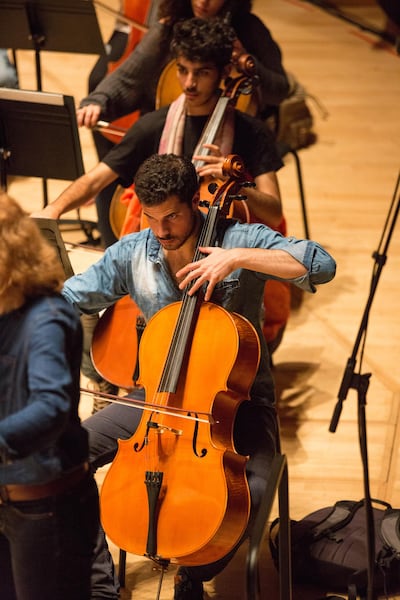Of the sea of articles, tweets and special shout-outs from celebrities, it was a musical performance by two relatively unknown artists that perhaps best captured the dawn of a new beginning in Saudi Arabia following the country’s lift of its ban on women driving.
Syrian singer Nano Raies and Palestinian cellist Naseem Alatrash’s Arabised cover of The Beatles’ Drive My Car was released on YouTube on June 22 – two days before the monumental decision came into effect. It has since been viewed more than 150,000 times on Facebook and YouTube. But the song hasn’t just catapulted the two musicians, who live in the United States, into the spotlight of the world’s music scene. It has also highlighted the rich depth of Middle Eastern music.
Speaking to The National from New York, Raies says that the seeds of the idea to record a regional take on the 1965 song by the Fab Four came from the renowned Berklee College of Music in Boston, and the radio producers of The World, a cultural magazine show broadcast on the US Public Radio International. "It came from a journalist around late April and early May, who said that he really wanted this song to be played on that day, but in Arabic," Raies recalls. "The message was given to Berklee College, who approached me to write it and sing it. I agreed straight away because I just loved the idea behind it."
From Homs to Berklee
This was the opportunity that Raies had long been waiting for.
The international acclaim the song received, which Raies hopes will result in a record contract, is only fitting, considering the struggles she went through to have her voice heard.
Born in the Syrian city of Homs, Raies kept her artistic dreams hidden because of her conservative and traditional community – she studied architecture in Aleppo, while music was relegated to a hobby at best. However, it was the onset of war and the harsh reality it brings, that convinced her to follow her path. “When the war broke out, I witnessed my family lose everything and friends and people dying,” she says. “At that moment, I understood that my dream of having a career in music was the only thing that no one could take away from me. Achieving it became my first priority.”
This meant taking the bus for the two-hour-long journey from Homs to the capital Damascus for weekly music classes. “It was the first seven months of the war, and somehow I just wasn’t afraid. I would go from Homs to the city for my class every Wednesday and straight back home,” she says. “I would live for that hour. I would go there, and for that class, I just felt truly myself. I felt so free and flying.”
It was that determination to make something of herself that drove Raies to travel to Beirut before she landed an audition at the prestigious Berklee.
Her jazzy performance of Arabic and Western songs not only convinced the college to accept her but to also invite her to play a gig a fortnight later.
It also provided her with a sense of purpose and a strong work ethic: upon accepting the brief for The Beatles cover, Raies went to work on penning the lyrics.
Keeping it original
Raies's version of Drive My Car is not a straight translation of the song. Where the original – chiefly written by Paul McCartney – was sung from a male point of view about an aspiring actress bemoaning her lack of wheels, Raies's version has her singing from the viewpoint of a Saudi Arabian woman whose new car has granted her a new-found freedom.
This is best emphasised in the second verse, where the original had the man smugly rebuffing the girl’s offer of being her chauffeur and her prospective beau.
Raies’s version has the man coming to ask for her hand by flaunting his credentials as an “ibn halal”, the son from a good family. In response to his advances, she retorts: “I told him, darling, money doesn’t matter to me/not even a house, which family (you are from) or children/but I won’t give you my car.” While pointed in its advocacy for female independence, Raies states that she kept the lyrics as light and breezy in tribute to the original.
“I love that song so I didn’t want to change it too much,” she says. “It is still fun and funny and the only thing I really did was mix it up with this new cause.”
The sounds of the region
When it comes to Berklee alumni and professional cellist Naseem Alatrash, who was responsible for all of the musical arrangements in the cover, he wanted to give the classic Beatles track “the Arabic Maqam (musical mode) treatment.”

This meant putting together an oriental band that featured a qanun and percussion (played by fellow Palestinians Tony Barhoum and Tariq Rantisi). Jordan's Layth Sidiq played violin and the American Jared Henderson was on bass. "I wanted to really capture the acoustic sound of the Arabic ensemble," he says. "Rock music is usually electric-based with very heavy drums and vocals that are strong, especially in the original Drive My Car where the vocals are sung with so much strength. What I was going for was the acoustic nature of Arabic music. For example, there is a cool guitar solo in the song and I thought we should use a qanun to do that instead because the instrument has the same range and nylon strings, which make it sound very sweet."
Another challenge that Alatrash faced when composing the arrangement was trying to find the Maqam complementary to The Beatles' bluesy turn in Drive My Car.
The mystical and slightly melancholic air surrounding the Arabic version is down to the use of the Maqam Hijaz, a musical mode linked to the Hijaz area in present-day Saudi Arabia.
“It is the Maqam that is probably the closest to the blues,” he says. “When we used this in the song it gave it a real Arabic flavour.”
While Alatrash was pleasantly surprised by the reaction to the cover, Raies said she fully expected it to strike a chord. “I just felt that this was a special project. The song was very simple and very fun and the cause was huge,” she says.
“We got a lot of people talking about it. I get messages on social media daily from people around the world. There are women in Saudi Arabia who say thanks for celebrating with them and then we get these big Beatles fans who are excited about hearing the song in a different way. They say that it sounds fresh and familiar at the same time, which I think is an awesome thing.”
_____________________
Read more:
How Saudi Arabia lifted the ban on women drivers
First Saudi female road traffic accident inspectors graduate
Vogue puts Saudi princess in the driver's seat
First Saudi women given driving licences ahead of law change
_____________________
And as for the thoughts of the original composer about her take on the track, Raies says she has yet to hear whether McCartney has listened to the new version. “I don’t think he has heard it yet, but I hope someone sends him our version,” she says. “I think he will like it.”


